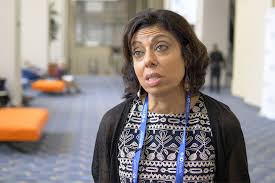Source: medpagetoday.com
At the recent 2019 IDWeek conference in Washington, D.C., much of the big news centered around HIV therapies.
In this exclusive MedPage Today video, Monica Gandhi, MD, associate chief for UCSF’s Division of HIV, Infectious Diseases, and Global Medicine in San Francisco, discusses some of the exciting developments in HIV presented at the meeting.
In terms of HIV, there were some exciting things that happened. There was a state of the art session, which went over, really, the key things going on in HIV right now. There was a talk by Dr. Joe Eron on long-acting antiretroviral therapy, which is tremendously important. We probably think the FDA will approve long-acting ARVs with a combination of intramuscular rilpivirine and cabotegravir by December. That seems to be the thought. Essentially, he was talking about the advantages of that, the disadvantages, which patient populations are going to benefit, and likely [with] non-adherent patients there’s going to be a big role for this because if they can’t take medications every day, maybe a once-a-month shot will help.
The second talk was actually on two-drug therapy, which really relates to this question of the long-acting because it’s two drugs. We’re getting into an era of two-drug therapy for HIV, which is very, very different, and in fact, a lot of the other abstracts I think we’re going to see coming up are going to be patients’ experiences from real-world clinics about two-drug therapy versus three. Really, that’s a combination mainly, at least orally, of dolutegravir and 3TC together with the results of the GEMINI and TANGO studies that were presented recently.
Then there was a talk on generics and generic antiretroviral drugs and how that’s going to change things. It’s all going to depend on insurance and it’s going to depend on our commitment as a nation to providing new HIV drugs on insurance plans, and I think everything is in flux right now, but generics are absolutely coming. Then later in the afternoon, there was a challenging HIV cases session that was very exciting. It was excellent — cases of very highly resistant HIV, what do you do in women of childbearing age. There was a case of opportunistic infections in HIV. It was just very challenging. Nothing necessarily new presented, but really a consolidation of everything that we’ve been learning over the last year in HIV.
Then finally, the session later in the afternoon, which was specifically on HIV and some HIV-specific abstracts. I think the most notable things from that were how people really like long-acting injectables in the injectable trials. There was a caveat to that, because if you choose to enroll in a trial of injectables knowing 50% of the time you’re going to be randomized to injectables, then clearly you don’t mind shots. But beyond that, it seemed like people really like injectables over taking their oral antiretroviral therapy.
Then there was really a look about how we are seeing so much virologic resistance in perinatally infected children that’s not going away. People who were infected a long time ago at birth, all the experience they’ve gone through really has led to high rates of virologic resistance. Then finally, I think we’re going to see this soon in print, but really the safety of raltegravir in pregnancy. That was very exciting, too. I think it’s been very interesting for HIV here, and we have a couple more things coming up. It’s a very ID-focused conference as well, and I do believe that HIV is getting more and more into IDWeek, and it’s been with really novel abstracts being presented, so it’s been an exciting example of that.
